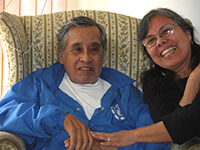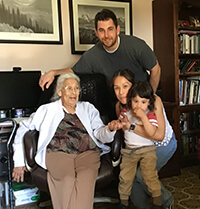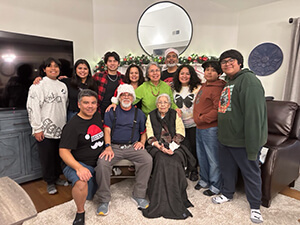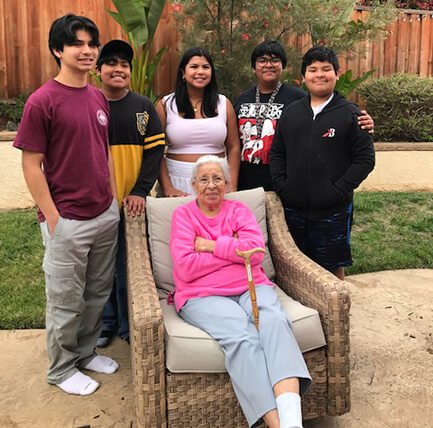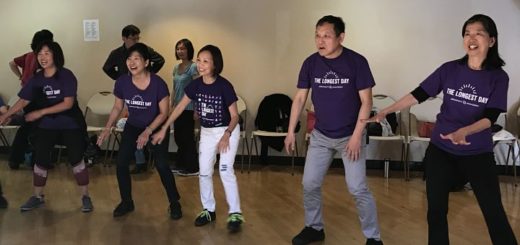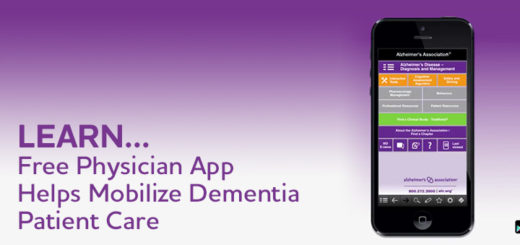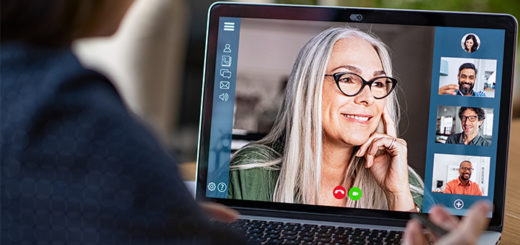A balancing act: A Native American woman’s struggle with dementia and self-care
Lydia of the Kakoon Ta Ruk Band of Ohlone/Costanoan Indians of the Big Sur cares for her mother-in law, Lucy, who has Alzheimer’s disease. Lucy’s defiance and paranoia, brought on by the disease, make caregiving a challenge. While Lydia views caring for her elders as respectful and an honor, it’s taken a toll on her and her husband’s health. Lydia shares the difficult choices she faces in balancing caregiving with her own well-being.
A call from Adult Protective Services
In 2006 Lydia’s father was diagnosed with dementia. She and her siblings helped their mother care for him until his death in 2015. Seven years later, Lydia recognized the early signs of dementia in her mother-in-law after visiting her in Texas. She expressed her concern to her husband, Michael, who had his doubts.
Lucy and Michael planned to make a return trip however, the night before they were set to leave, Michael had a heart attack which delayed him for six months. By the time Michael was finally able to return to Texas, the disease had progressed enough that he knew his mother would need more care and planned to bring her home. Unfortunately, Michael was delayed again due to a ruptured ear drum that needed immediate medical attention.
Because of this delay, neighbors had noticed that Lucy had stopped caring for herself and wasn’t eating properly, so they contacted Adult Protective Services (APS). APS called Michael and informed him that he needed to come up with a plan to care for his mother. APS had taken Lucy to her doctor where she was diagnosed with Alzheimer’s disease.
“Friends of Lucy took her into their home until the doctor said it would be safe for Michael to travel,” said Lydia. “Once in Texas he took his mother back to her doctor to have her evaluated again and was told she had Alzheimer’s disease. My husband told them she was coming home with us.”
Caring for Lucy
Native Americans are more likely to develop Alzheimer’s or other forms of dementia than White or Asian Americans. One in five Native American adults aged 45 and older reports experiencing memory or thinking problems that might be a sign of dementia. Within Native American cultures, tribal elders are revered and are held in great esteem and thus more likely to care of their Elders at home.
Taking care of Lucy was harder than they anticipated. Unlike Lydia’s father, who had been easy to care for, Lucy was feisty. Everything became a battle—getting her out of bed, helping her shower, changing her diaper—it quickly became a 24/7 job.
Lydia and Michael realized they couldn’t do it alone. They started looking for help and reached out to In-Home Supportive Services (IHSS), a program that helps families care for elderly loved ones. Lydia had several potential caregivers come out to interview but none of them wanted to take on helping Lucy or worked with Lydia and Michael’s schedules.
Eventually, the person from IHSS suggested that instead they pay Lydia as a caregiver, since she was already doing the work. As a Native American, caring for an elderly family member is something that is just expected, getting paid for it felt wrong to Lydia. Eventually she was convinced to take the money but chose to save it for an emergency, something that would end up helping her later on in her caregiving journey.
Finding help
Lucy began attending an adult daycare center, which gave Lydia and Michael some time to rest. Still, the stress of caregiving took a toll on Lydia’s health. “We put all of our health on the backburner to take care of Lucy, “said Lydia. “There was no time for us. I was so exhausted from not enough sleep during the night. [The daycare] was wonderful and we felt so blessed to have the center to take her to.”
A few months later, Lydia was able to find a wonderful caregiver, who helped bathe Lucy, kept her room and bathroom clean, and gave her some much-needed attention. The caregiver even played puzzles with Lucy.
The importance of education
Throughout caring for Lucy, Lydia and Michael were connected to dementia education programs in their community. There they learned better ways to understand Lucy’s condition.
“We [learned a better] way to approach Lucy at one of these classes,” said Lydia. “It was so wonderful. I [learned that I] was approaching her wrong. I was always standing over her, they said to sit down at their level, so they don’t feel like you’re above them and telling them what to do.”
Lydia and Michael learned that sundowning is increased confusion that people living with the disease may experience from dusk through night. “I learned about sundowning,” said Lydia. “I didn’t know what that was. This is what was happening to Lucy in the evenings, but we didn’t know why she was having tantrums.”
Caregiver stress
According to the Alzheimer’s Association 2024 Alzheimer’s Disease Facts and Figures report, for some caregivers, the demands of caregiving may cause declines in their own health. Evidence suggests that the stress of providing dementia care increases caregivers’ susceptibility to disease and health complications.
Thirty-eight percent of Alzheimer’s and other dementia caregivers indicate that the physical stress of caregiving is high to very high. Fifty-nine percent of family caregivers of people with Alzheimer’s or other dementias rated the emotional stress of caregiving as high or very high. In California, where Lydia lives, 61% of caregivers report at least one chronic condition and 13% report poor health.
These statistics applied to Lydia and Michael. The first was when Lucy called 911 to report that she believed she was being held hostage and starved. When the police and ambulance arrived, Lucy demanded to be “saved” and taken to the hospital. Upon inspection of the home, and Lydia explaining that Lucy had dementia, the police then understood the situation.
Unfortunately, Michael began having chest pains and was rushed to the hospital. It turned out to be an anxiety attack. Three months after caring for Lucy, Lydia was worried she was having a stroke. Lydia was diagnosed with high blood pressure and spent the next three days at the hospital.
Unexpected brain surgery
During the first year of caring for Lucy, Michael’s brother died. With so much going on, it was suggested to them that they place Lucy in a local care setting for a week so Lydia and her husband could go on a vacation together.
In October 2024, they headed to Tahoe, California for a week-long vacation. However, Michael spent almost the whole day sleeping. By the third day she knew something was wrong. She called the advice nurse and were told to take him to the emergency room. They found a hematoma on his brain (a collection of blood in and around his skull).
Knowing Michael would need time to recover after brain surgery, Lydia used the money IHSS paid her to cover the cost of care her mother-in-law would need to remain in the care setting for another month. As of the writing of this blog, Lydia is considering extending it through the end of 2024 in order for her family to fully recover.
“Even though part of me still feels like it’s wrong that she’s there, I just have to pray on that. It’s hard for me,” said Lydia. “Now our kids, are worried for us. Our children [tell us] ‘You can no longer take care of grandma. We’re worried about you.’ They’re looking for permanent placement for Grandma. We have such mixed feelings.
“The new generations aren’t afraid to ask for assistance to care for their elderly loved ones. They know they must take care of themselves, so they can make sure their loved ones are cared for.”
The power of community
Throughout this journey, Lydia has found strength in her Native American community. She believes that the medicinal power of prayer and support from loved ones have been key in helping her through the hardest times. Lydia feels blessed to have people who care for her family.
“I’m what we call Urban Indian,” said Lydia. “I’m from a non-federally recognized tribe. Our land was taken. We connect with so many [here] because of the ceremonies we attend. We’re a part of their families, and they’ve taken us under their wings. Though we bought our home and live in the town of Woodland, we qualify for health and wellness benefits for Native Americans.
“We’re still all connected with our neighboring tribes. My nieces from the Colusa reservation brought us acorn soup, and they have brought us seaweed when they go out to gather. We have so many Prayer Warriors in our Native community. They’ve been here for us. That’s what we do as Native people we take care of each other.”
Advice to caregivers
Lydia’s advice is simple: Take it one day at a time. Caregiving is different for everyone, and there’s no “right” way to do it. It’s important to be patient with yourself and ask for help when you need it. Trust your community, seek out support, and don’t be afraid to take breaks.
Lydia reminds people that they’re not alone. There are resources, support groups, and classes available to help guide you through the difficult times. Even in the toughest moments, there is hope and strength in community.
For more information on Alzheimer’s disease in the Native American community visit alz.org/nativieamerican
For more information on caregiver stress visit alz.org/caregivierstress





